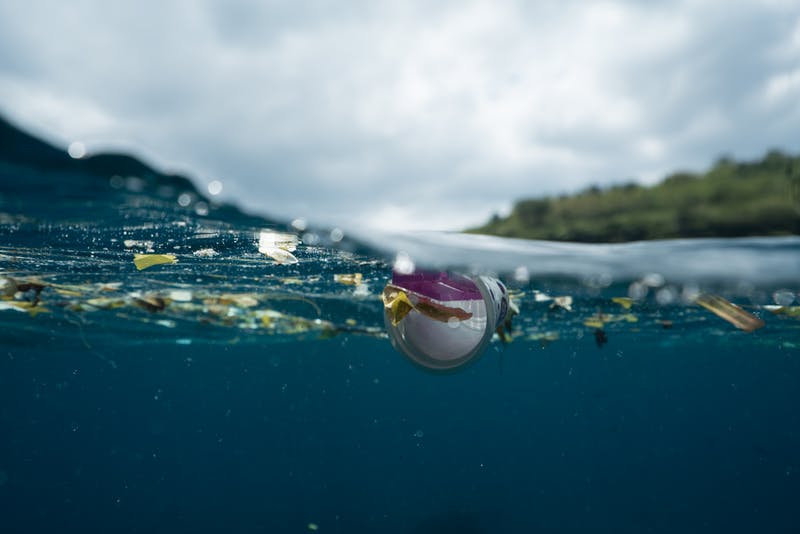Green Pea’s Director of Operations and volunteer writer, Zoe MacBean, speaks about the severity of the plastic crisis we are seeing across our oceans today and why we should care about it.
In recent times, awareness of the vast amount of plastic entering our oceans has increased and become global knowledge. This means that it is now in the forefront of many people’s minds and we must grasp this opportunity to make changes to the amount of plastic we use. If we are to do this, we must understand what actions are being taken. We must understand what we can do on a global and local scale to solve this problem, as each of us has a shared responsibility to help in any way we can.
Nearly 8 million metric tonnes of plastic enters our oceans each year, which adds to the 150 million metric tonnes that is already circulating in the oceans at present. This is equivalent to around 1.2 million blue whales weighing an average of 125 tonnes each circulating the globe.
So why is it important that we tackle this issue? Plastic can destroy natural habitats such as beaches or coral reefs, by swamping them. It can also kill or harm animals that ingest the rubbish. More worryingly, microplastics have begun to bioaccumulate in the food chain as animals cannot excrete or break down plastic; which according to World Wildlife Fund 2020 data means that we humans are now indirectly ingesting an average of five grams of plastic a week, which is the size of a credit card – a shocking statistic. Not only does plastic build up in the food chain but, huge swathes of floating garbage are present in the ocean at the Gyres, the five key areas where the strong ocean currents meet around the globe.
I hope I have given you a series of scary yet truthful facts and that you’re worried. However, there are global brands and governments that are trying to tackle this issue which should also give you hope. A very notable company is 4OCEAN, who have now removed over 10 million pounds of plastic from the ocean. They are turning the plastic into sustainable products such as reusable water bottles, t-shirts and hardcore ziplock bags and trying to educate and encourage people to use long term products. All the while they are promoting sustainable habits and trying to reinforce a widespread message that we should reuse items; breaking our consumer ideal that new and more is better.
As well as companies solely dedicated to tackling the problem directly, there are everyday household brands, such as Apple, making a greater effort to bring about change. In a press release on 15th September 2020, Apple pledged that they wanted to be 100% carbon neutral by 2030 and are now using recycled wood fibres for packaging instead of plastic. This is so important as Apple products reach millions of consumers right across the world.
Global action is also being taken by individual countries and their governments. On 9th January 2018 the UK’s Conservative government banned the use of microbeads, effectively stopping billions of tiny pieces of plastic washing down the drain every year. Another significant contributor to plastic waste is China, who create 28% of the global plastic production total. China have set in law that they are going to ban the production and sale of disposable tableware, straws and plastic cotton swabs by the end of 2020. And, all non-biodegradable plastic bags will be phased out nationwide by 2025. It is vital that global brands and governments take these steps to reduce the amount of plastic produced and consumed, as they have the power to make the biggest impact on a large scale with decisive and quick actions.
Whilst mass global reductions are key, the actions of individuals and local communities are equally important in the war on plastic. Each of us can make a major contribution by reducing our own individual plastic footprint. Globally, local refill shops are popping up enabling people to stop buying new plastic containers and fill old glass or plastic tubs directly from suppliers. Another local initiative is terracycling – the siting of recycling points in schools or shops as points of collection for particularly hard pieces of plastic to recycle. They operate at a local scale but, globally they have over 202 million collectors in 21 countries with the majority of their profits going to charitable organisations.
Ultimately, it will need a collective effort from each and every one of us to reduce the amount of plastic we use by changing our habits, swapping to sustainable practices, choosing to walk or cycle and being environmentally conscious in everything we do. An easy way to start as a student would be to head down to Green Pea, our sustainable shop based in the union, which can help you make eco-friendly choices and start your sustainable journey.
Featured header image by Frankie Stevens.


